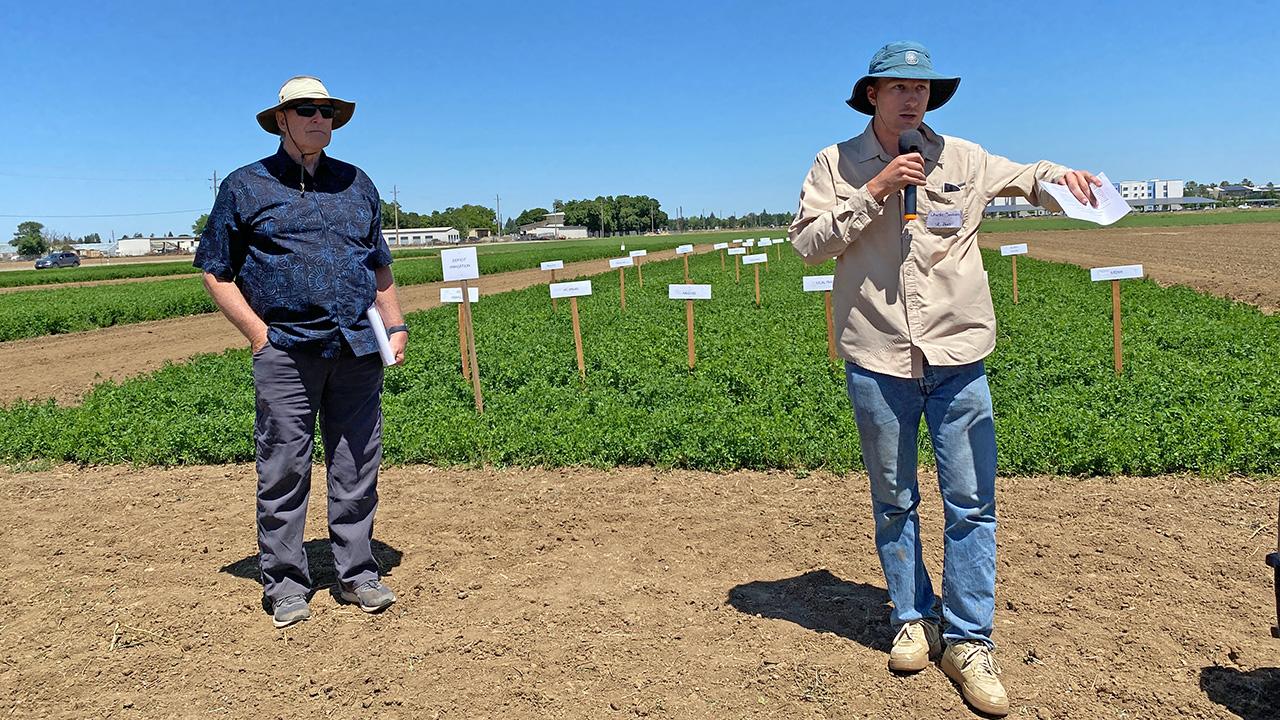
Alfalfa scholarship fund named for Putnam
King, Janssen win inaugural awards for research
The DH Putnam Scholarship Fund has launched with two inaugural awards given in honor of Daniel Putnam, professor emeritus of Cooperative Extension in the UC Davis Department of Plant Sciences. The fund supports scientific research that benefits alfalfa production and use in California.

Awardees Cree King and Charles Janssen are master’s degree students in the horticulture and agronomy graduate group. They work in the lab of Charlie Brummer, Putnam’s colleague and a professor in the department. Putnam worked in the department for many years before retiring in 2023.
King and Janssen received the scholarships from the California Alfalfa and Forage Research Foundation in October. The foundation is managed by the California Alfalfa and Forage Association, of which Putnam is a founding member.
The students’ work carries on Putnam’s legacy.
“I am extremely proud of my students who received these scholarships,” Brummer said. “They are the next generation of alfalfa scientists working to keep alfalfa successful into the future. I’m extremely grateful to the CAFRF for supporting these young scientists as they pursue their graduate studies.”
Continuing the legacy of alfalfa research has state and national implications: California growers produced more than $1.2 billion in alfalfa in 2022, according to the state Department of Food and Agriculture.
As animal feed, alfalfa grown here impacts other key agricultural sectors: Dairy is the state’s top commodity, worth nearly $9.7 billion in 2022, the CDFA reported. With more than 1.7 million dairy cows, the state produces more than 20 percent of milk consumed in the United States, according to the U.S. Department of Agriculture.
King: Improve survival, yield of alfalfa on grazing lands

King is breeding improved varieties of alfalfa that will thrive despite drought on rainfed rangelands in Northern California. She will evaluate the survival and persistence of current alfalfa varieties in grazed rangelands where drought occurs often.
In addition, King will incorporate a “creeping-rooted” trait into non-dormant alfalfa cultivars to improve plants’ survival and yield. From those experiments, “desirable plants will be selected and intercrossed to create improved populations with grazing tolerance, creeping rootedness and increased winter productivity,” King wrote in her proposal.
She hopes the resulting varieties would increase the productivity of California’s rangelands.
Janssen: Alfalfa for a water-challenged future
As the climate grows warmer, California’s alfalfa growers likely will be unable to fully irrigate their crop throughout the growing season. Janssen’s research seeks ways to reduce water use by strategically withholding water during parts of the growing season, a technique called deficit irrigation.
“Our research aims to determine how much water can be conserved by deficit irrigation, and whether certain alfalfa varieties are better suited for summer deficit irrigation while still maintaining yield potential and stand survival once irrigation is resumed,” Janssen wrote in his proposal.
Janssen already has established trials in Davis and El Centro, Calif., using experimental varieties of alfalfa developed at UC Davis and New Mexico State University, plus already released and experimental varieties from private seed companies. “We aim to identify cultivars well-suited to deficit irrigation and make recommendations to growers,” Janssen wrote.
Janssen also works on a joint project with Putnam.

“A true giant”
The DH Putnam Alfalfa Scholarship Fund was established in 2023 to honor Putnam’s many contributions to the alfalfa and forage industry and to the Western Alfalfa and Forage Symposium.
“Putnam has worked on alfalfa for more than three decades,” the CAFRF said. Over that time, he has “conducted research and extension activities focused on industry needs, including developing best management for irrigation, harvest schedules, nutrient management, pest management, variety performance, forage quality, determining how to manage alfalfa in drought years, and identifying new forage crops for diversifying grower markets.”
Putnam has been a chair of the Symposium for 30 years.
Brummer called Putnam “a true giant in the alfalfa world and an outstanding role model for new scientists to emulate…
“Dan spent his career dedicated to improving alfalfa production, from conducting practical research experiments to extending knowledge through his tireless extension programming around the state, the nation and the world,” Brummer added.
Alfalfa nationally important
Alfalfa is a highly nutritious crop used mainly to feed beef and dairy cattle. California is the nation’s leading producer of alfalfa: It’s the state’s highest-acreage crop, with 510,000 acres harvested in 2023, the USDA reported.
But alfalfa also is thirsty, with a long growing season and deep roots that draw up more water than most other grain and vegetable crops. Its production figures into the growing controversy over rights to the water flowing in the Colorado River: Alfalfa production consumes an estimated 80 percent of the river’s water. Yet it’s also drought-resistant, high-yielding and a year-round crop essential for other agricultural sectors, making it highly impactful for the water it uses, Putnam argued in a 2015 article.
Media Resources
- Charlie Brummer, ecbrummer@ucdavis.edu or (530) 752-9261
- Trina Kleist, UC Davis Department of Plant Sciences, tkleist@ucdavis.edu, (530) 754-6148 or (530) 601-6846
